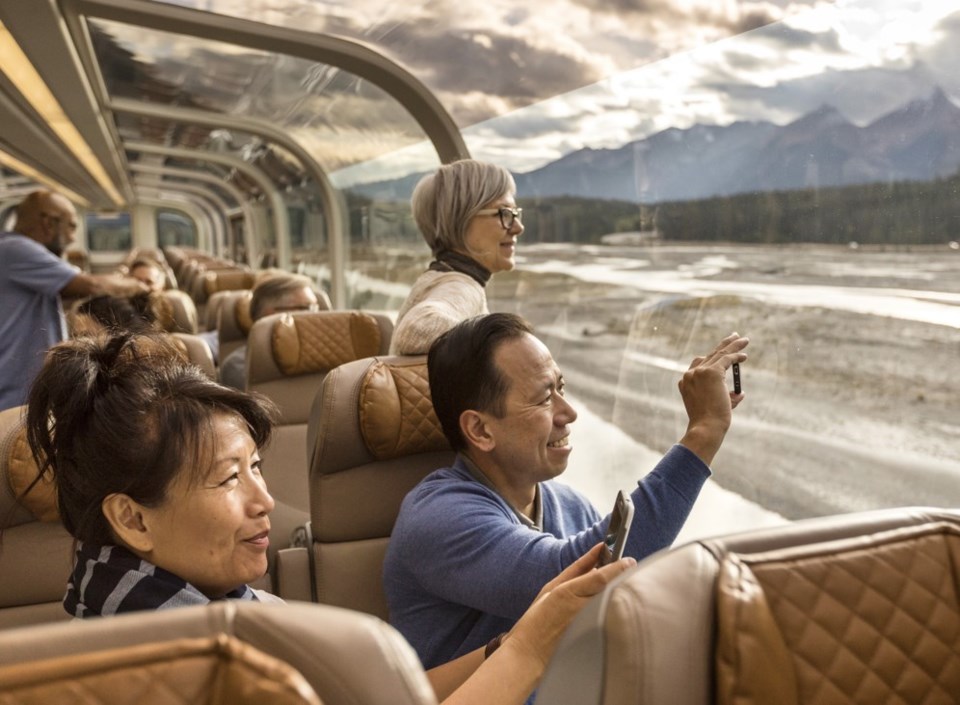An expanded route network, increasing demand for travel, international recognition for its routes and an ability to pass on increased costs to customers is set to make 2024 the most successful season in Rocky Mountaineer's 34-year history.
The Vancouver-based luxury train-travel company company also has a new CEO.
Tristan Armstrong this week is slated to move to be CEO after being interim CEO since November. He has been on his company’s board since 2016 and its executive chairman since the start of 2023.
Being the son of the railway's founder, Peter Armstrong, means that Armstrong "grew up in the business," he told BIV.
Armstrong expects 97,500 passengers on his railway in the season that starts April 15, and runs until late October, with departures six days per week on Canadian routes and twice per week on a route in the U.S.
That is up from a record of approximately 96,000 passengers last year, and it is likely to give B.C.'s tourism sector a well-needed boost.
The rise in Rocky Mountaineer passenger counts comes as train travel enjoys a worldwide resurgence.
Statistics giant Statista estimated that passengers in 2022 travelled 1.31 billion kilometres on intercity and international trains worldwide, and that this distance is set to rise to 6.64 billion kilometres by 2050.
Comparing the 97,500 passengers that Rocky Mountaineer expects on its trains this year to the 95,000 passengers who travelled on those trains in 2019 is not fully an apples-to-apples comparison, given that the company pre-pandemic did not have an American route.
In 2021, it launched what Armstrong called a “preview” season for a route between Moab, Utah, and Denver, Colorado. That route became fully operational in 2022.
Armstrong said he expects about 87,000 passengers to travel on his company’s three B.C. routes this year, which would be approximately 8.4 per cent fewer passengers than pre-pandemic.
Fewer railcars is one reason that is the case.
Armstrong called his company’s U.S. route a “greenfield opportunity” because no one was operating high-end train travel in that region.
Rocky Mountaineer repositioned what Armstrong called “under-utilized” train cars to the U.S. from B.C.
“[Former Canadian Pacific Railway president] William Van Horne had a saying: ‘You can't export the scenery. You have to import the tourists to the Canadian Rockies,” Armstrong said.
“We took a twist on that. We couldn't import the tourists because of the pandemic so we ended up exporting our rail cars to our biggest market.”
Buying new railcars to replace those taken out of the Canadian market is likely to eventually be on Armstrong’s agenda.
“We do plan on that as we continue to restabilize the business following the pandemic,” he said.
Rocky Mountaineer’s fleet so far includes 26 GoldLeaf domed two-level rail cars, 18 SilverLeaf single-level domed cars, two lounge cars, 13 crew cars, eight generator cars and 11 locomotives.
Its B.C. routes all leave Vancouver.
“Our First Passage to the West route, which takes us to Banff and back is our most popular route,” said Armstrong.
“The second most popular would be the Journey Through the Clouds route, which goes Vancouver – Kamloops – Jasper. Then we are still building out what we call Rainforests to Gold Rush, which goes Jasper – Quesnel –Whistler – Vancouver.”

(Image: Tristan Armstrong this week officially became CEO at Rocky Mountaineer | Rocky Mountaineer)
Passengers travel on the train during the day and stay at hotels at night so they can maximize scenery viewing during daylight hours.
The company this year is raising prices by a mid-single-digit percentage, after keeping prices steady during the pandemic, Armstrong added.
Fares range between $2,049 and to $11,751, depending on the package.
Rocky Mountaineer's B.C. journeys are touted as among world's best
While Rocky Mountaineer’s U.S. route is just starting to get noticed by the global community of railway-travel enthusiasts, its Canadian routes are well known.
InsureMyTrip.com in February ranked Rocky Mountaineer’s routes as the sixth best in the world, ahead of VIA Rail’s Canadian train trip, which travels between Vancouver and Jasper on the same track as the Rocky Mountaineer, and then continues to Toronto.
Respected travel magazine Condé Naste Traveler’s readers’ choice awards last year ranked Rocky Mountaineer’s routes as the seventh best train trips in the world, while VIA Rail’s Canadian route ranked No. 17.
“On any list of best train trips – done anywhere around the world – Rocky Mountain is always on the list,” said Rick Antonson, a travel author and former CEO at what is now Destination Vancouver.
“Sometimes it is at the top, depending on the nature of the list, but it is certainly in the top 10.”
Antonson, who told BIV he has travelled on trains in 36 countries, including rarely visited North Korea, released the travelogue Train Beyond the Mountains last year. That book documented Antonson's travel on the Rocky Mountaineer with his grandson, Riley.
One thing that sets the Rocky Mountaineer apart from other railways is that glass wraps around the GoldLeaf railcar roofs more than Antonson has seen on any other railcars in the world, he said.
Service is also exceptional, he added.
“The onboard ambiance and service and calibre of meals is as good as you’re going to get,” Antonson said. “Lunch on board the Rocky Mountain is probably the best view you are going to get when dining, anywhere in the world.”
Armstrong told BIV that his company is in the peak of its hiring season. The company employs about 300 people year-round and adds about 800 people on a seasonal basis.
"I think we have had more than 2,800 applicants for these roles," he said.



